Understanding the stages of emotional healing in addiction recovery
Navigating Emotional Horizons in Recovery
Embarking on the Emotional Journey of Healing
Addiction recovery is a multifaceted journey that encompasses physical, behavioral, and profoundly emotional transformation. Understanding the distinct emotional stages that individuals face provides critical insight for therapists, families, and individuals themselves, fostering empathetic support and tailored interventions. This article explores the complex landscape of emotional healing in addiction recovery, highlighting scientific models, emotional responses, and practical strategies for fostering resilience.
The Foundations: Stages of Change and Emotional Processing
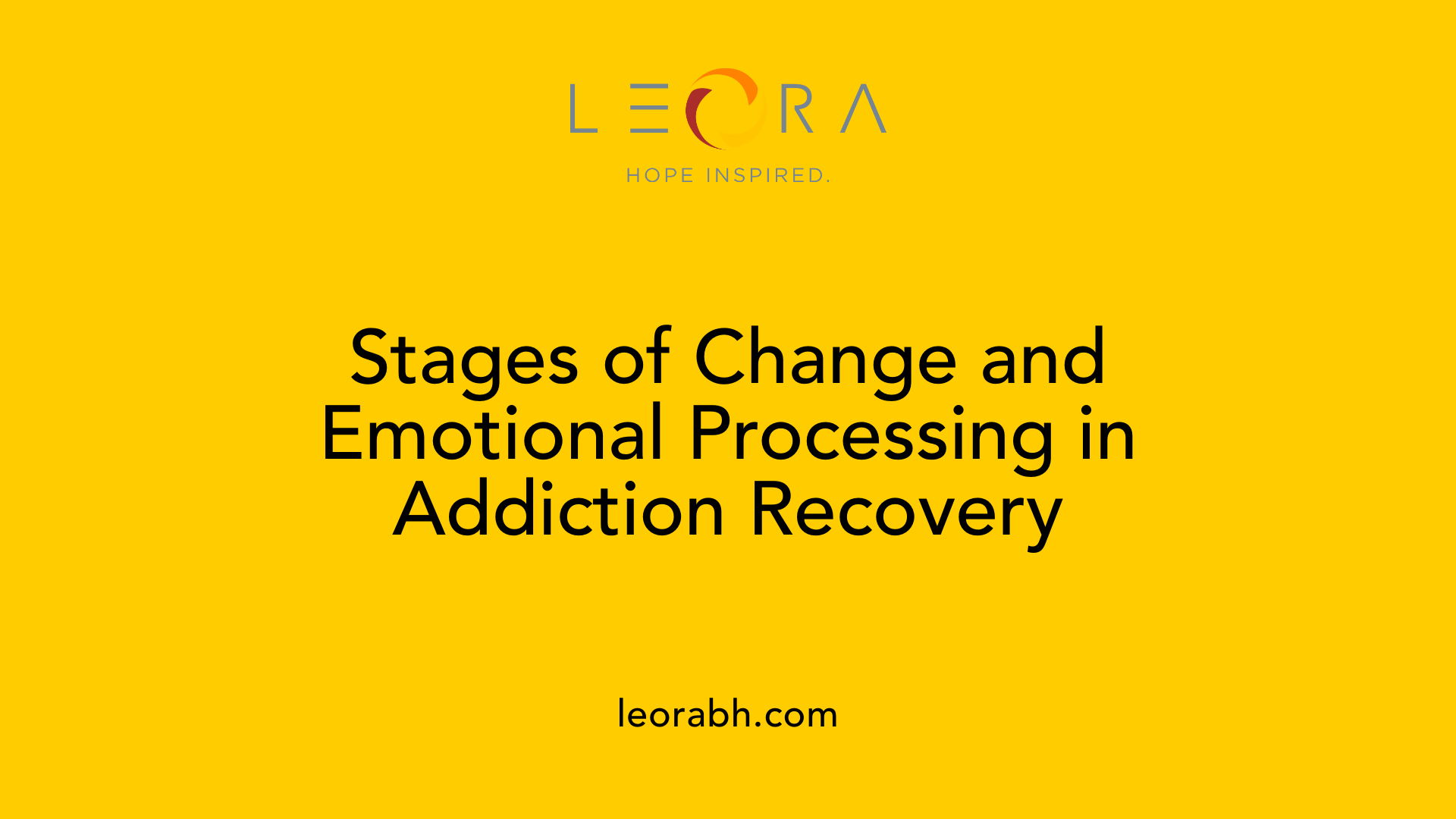
What are the common stages of emotional healing in addiction recovery?
The emotional journey during addiction recovery can be likened to the stages of grief, initially identified by psychiatrist Elisabeth Kübler-Ross. These five emotional stages include denial, anger, bargaining, depression, and acceptance.
In the early phases, individuals often experience denial, resisting acknowledgment of their addiction's impact. They may also feel anger directed toward themselves, loved ones, or external circumstances, as part of their frustration with their situation.
As they progress, bargaining becomes common. This involves attempts to regain control, such as making deals with themselves or a higher power, to delay or avoid full acceptance. Feelings of sadness and despair frequently accompany this stage, reflecting an awareness of the losses and damage caused.
Acceptance marks a crucial shift where individuals acknowledge their condition openly. This can lead to embracing ongoing recovery efforts with a renewed sense of hope. Importantly, these emotional stages are often non-linear; individuals may cycle through them multiple times before achieving lasting emotional resilience.
Understanding these emotional processes helps individuals and their support networks prepare for the psychological challenges encountered on the path to sobriety, fostering compassion and patience throughout the journey.
How do emotional and psychological processes evolve during addiction recovery?
As individuals work through addiction recovery, their emotional and mental states undergo profound changes. Initially, healing involves confronting difficult feelings such as grief over lost relationships, guilt about past behaviors, and shame about substance dependence.
People often experience intense emotions like anger and feelings of depression, which can be linked to trauma or underlying mental health conditions such as bipolar disorder or anxiety. Managing these emotions is essential for sustainable recovery.
Therapies such as Cognitive Behavioral Therapy (CBT) and trauma-informed approaches help individuals develop coping strategies to regulate emotions effectively. These methods aim to build emotional resilience by addressing negative thought patterns, emotional dysregulation, and unresolved trauma.
Throughout recovery, emotional stability is not achieved overnight. The process is dynamic, with mood swings, cravings, and emotional turbulence common, especially during stressful life events or setbacks.
Long-term recovery involves continuous emotional growth—learning to accept vulnerability, foster self-compassion, and rebuild self-esteem. Establishing a support system, engaging in mindfulness practices, and pursuing holistic healing complement psychological healing, creating a balanced emotional foundation for lasting sobriety.
Overall, the evolution of emotional and psychological health during recovery is a layered journey requiring patience, self-awareness, and ongoing therapeutic support. Understanding this evolution helps to normalize setbacks and encourages persistence, emphasizing that recovery is a gradual, yet achievable, transformation.
The Significance of Emotional Healing in Long-term Recovery
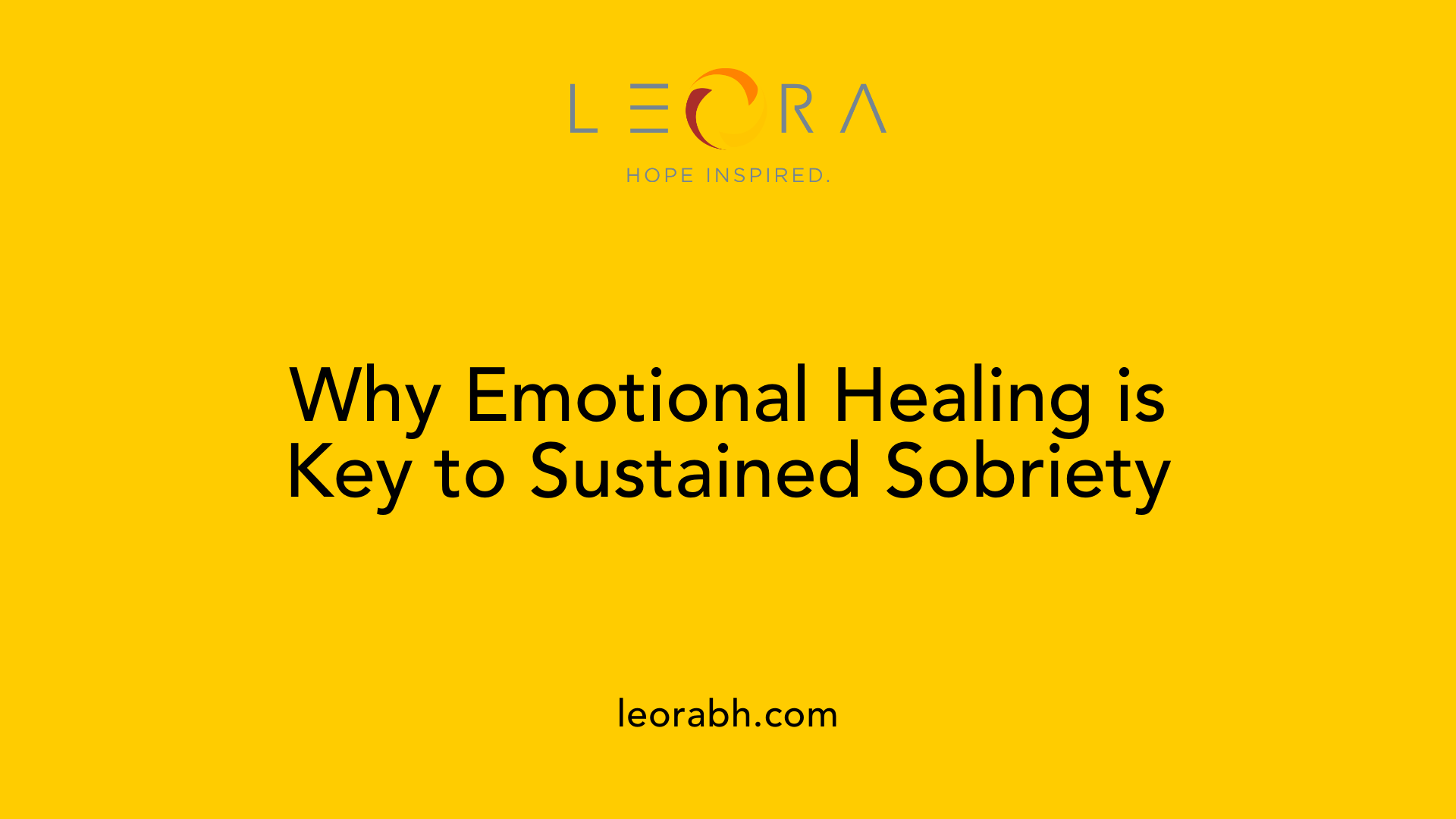
Why is emotional healing important in the process of addiction recovery?
Emotional healing holds a central place in the journey of overcoming addiction. It goes beyond the physical dependence on substances and addresses the emotional wounds, mental health issues, and negative feelings that often underpin addictive behaviors.
Many individuals struggling with addiction carry unresolved trauma, feelings of guilt or shame, and emotional dysregulation. These emotional factors can trigger cravings and increase the risk of relapse if left unaddressed. Healing emotionally helps individuals confront these issues, allowing them to develop healthier ways to cope with stress, depression, or anxiety.
Therapies like Cognitive Behavioral Therapy (CBT), Dialectical Behavior Therapy (DBT), mindfulness practices, and trauma-informed approaches are effective tools in emotional recovery. They help build emotional awareness and regulation skills, reducing impulsivity and emotional reactivity.
Furthermore, emotional healing enhances motivation and resilience. As individuals begin to understand and process their feelings, they often find renewed purpose and strength to maintain sobriety. It also plays a vital role in rebuilding relationships, which are fundamental to a sustained recovery.
Importantly, focusing on emotional well-being contributes to overall physical health and life satisfaction. It fosters hope, fosters confidence, and supports the development of a positive self-identity beyond substance use.
Without a focus on emotional health, individuals are more vulnerable to emotional triggers, stress, or setbacks that can threaten their sobriety. This makes emotional healing an indispensable part of comprehensive addiction treatment and long-term recovery strategies.
How does emotional processing help prevent relapse?
Emotional processing helps individuals recognize and understand their feelings, enabling early identification of emotional triggers that could lead to relapse. By developing resilience and emotional regulation skills, they are better equipped to handle stressful life events without resorting to substance use.
Engagement in ongoing emotional therapy and self-care practices sustains these protective benefits, helping individuals maintain their sobriety even in challenging circumstances. Overall, emotional healing not only facilitates initial recovery but also supports lifelong resilience and well-being.
Strategies and Therapies Facilitating Emotional Recovery
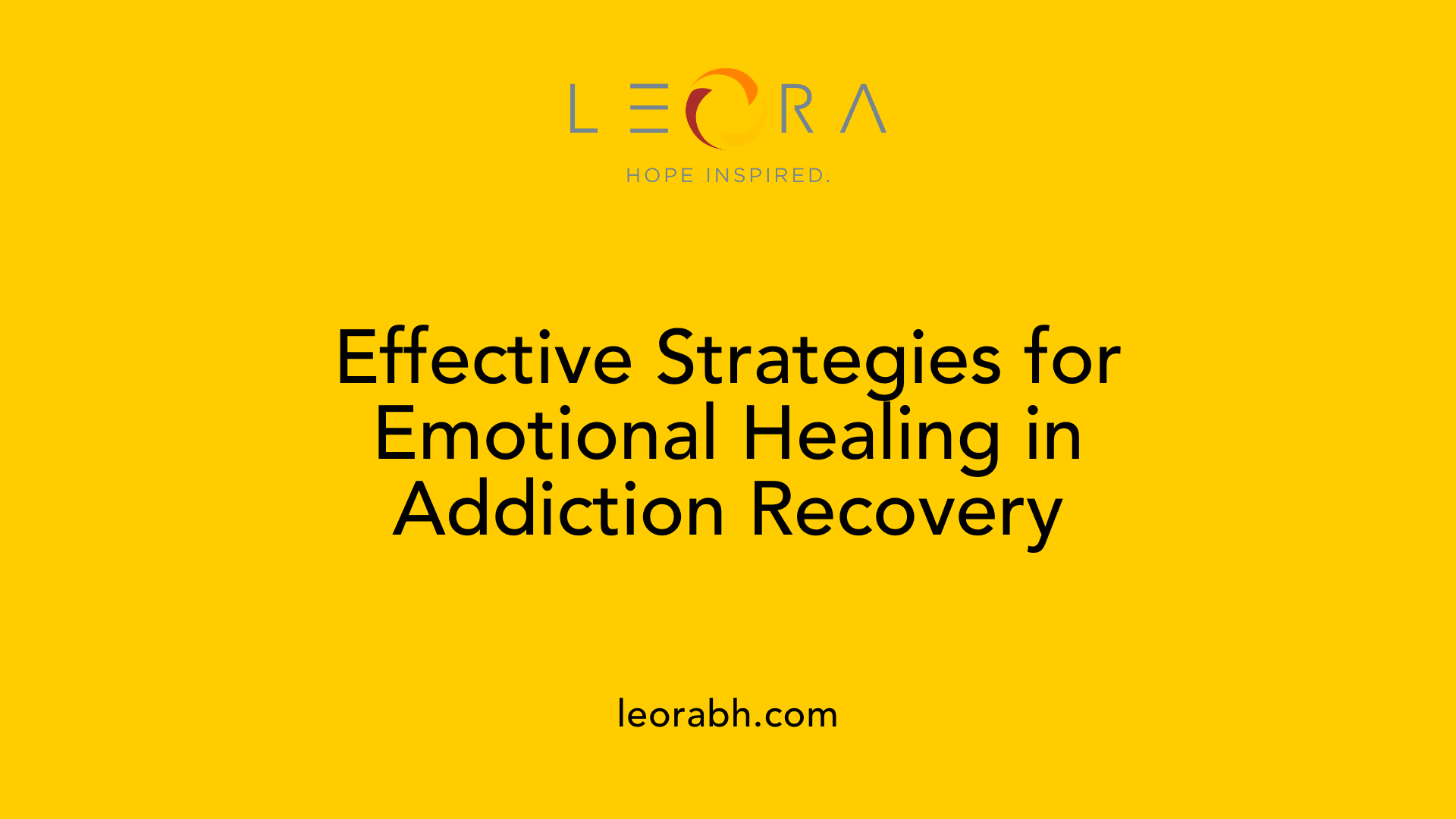
What strategies can facilitate emotional recovery during addiction treatment?
Emotional recovery is a critical component of overcoming addiction, requiring targeted strategies that help individuals manage their feelings effectively. Evidence-based emotion regulation techniques, such as cognitive restructuring, distress tolerance, and mindfulness practices, are foundational tools. These techniques enable individuals to handle intense emotions, curb impulsivity, and maintain emotional balance.
Cognitive Behavioral Therapy (CBT) is widely used to challenge and change negative thought patterns that fuel distress. Dialectical Behavior Therapy (DBT), on the other hand, specializes in teaching skills for emotional regulation, interpersonal effectiveness, distress tolerance, and mindfulness. Eye Movement Desensitization and Reprocessing (EMDR) is particularly effective for addressing trauma, which often underpins addictive behaviors. EMDR helps clients process traumatic memories, reducing their emotional charge and promoting healing.
Beyond talk therapies, experiential and holistic approaches play a vital role. Creative activities like art therapy, music therapy, and animal-assisted therapy allow clients to express feelings non-verbally, fostering emotional expression and subconscious processing. Engaging in physical activities such as yoga, acupuncture, and nutritional counseling supports overall mental health, boosts resilience, and helps manage stress.
Support systems and community involvement are equally important. Family therapy and motivational interviewing can strengthen relationships and increase motivation for change. Participation in peer support groups like 12-step programs provides ongoing emotional and social backing, which is essential for long-term stability.
Holistic approaches recognize the interconnectedness of mind and body, integrating practices like mindfulness meditation, physical exercise, and nutrition to promote emotional well-being. These interventions help individuals build new coping mechanisms, develop resilience, and reduce the likelihood of relapse.
Overall, a comprehensive treatment plan combining evidence-based therapies, experiential strategies, and community support creates a robust framework for emotional healing. This multifaceted approach addresses the psychological roots of addiction and equips individuals with the tools necessary for sustained emotional health.
Theories and Models Explaining Emotional Healing
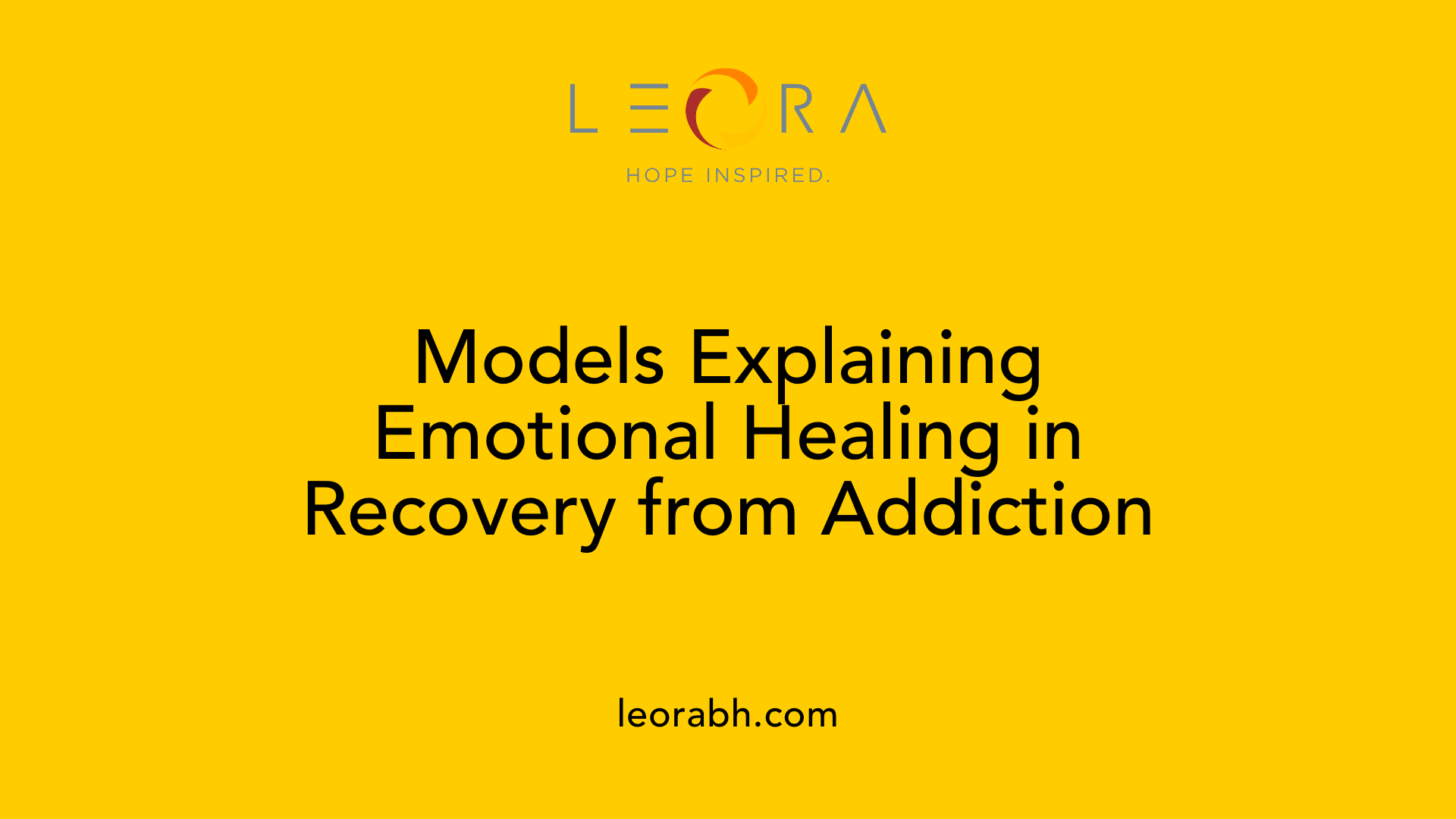
Are there theoretical models that explain emotional healing in addiction recovery?
Yes, the process of emotional healing in addiction recovery is explained through various models that address emotional, psychological, and social dimensions. These frameworks provide insight into how individuals transition through healing stages and establish resilience.
Traditional models like the Transtheoretical Model, developed in the 1970s, emphasize the stages people go through to change addictive behaviors. This model includes precontemplation, contemplation, preparation, action, and maintenance, highlighting that emotional readiness is essential for progressing in recovery.
Another influential framework is the Grief Model, which views addiction recovery as an emotional journey similar to grief processing. It recognizes emotions like denial, anger, bargaining, depression, and eventual acceptance, helping individuals understand and navigate their feelings.
Trauma-informed approaches have gained prominence, viewing addiction as often rooted in unresolved trauma. The Trauma-Informed Model advocates for safety, trust, peer support, and empowerment, addressing emotional dysregulation and promoting recovery through trauma processing.
Emerging models integrate mindfulness practices, such as the Mindful Resiliency in Recovery Model (MRRM). This approach emphasizes techniques like decentering, reappraisal, and acceptance that help reduce shame, rebuild self-awareness, and foster emotional resilience.
Furthermore, social support theories—including social control, social learning, and stress and coping models—highlight the importance of community, relationships, and adaptive coping strategies. These theories suggest that social connections can buffer stress, reinforce positive behaviors, and facilitate emotional healing.
Below is a summary of these models:
| Model/Framework | Focus Area | Notable Elements | How They Aid Emotional Healing |
|---|---|---|---|
| Transtheoretical Model | Behavior Change | Stages of readiness | Guides tailored interventions aligning with emotional states |
| Grief Model | Emotional Processing | Denial to acceptance | Helps individuals understand and navigate their emotional landscape |
| Trauma-Informed Care | Trauma Recovery | Safety, trust, empowerment | Addresses emotional dysregulation caused by trauma |
| Mindful Resiliency (MRRM) | Mindfulness & Resilience | Decentering, reappraisal, acceptance | Reduces shame and stigma, enhances emotional regulation |
| Social Support Theories | Social Dynamics | Support networks, social skills | Strengthens social bonds, boosts resilience |
The combination of these models underscores that emotional healing in addiction recovery involves a multifaceted approach. Personal growth depends on addressing emotional wounds, developing resilience, and fostering supportive relationships.
For individuals on their recovery path, understanding these models can cultivate patience and self-awareness. Tailored interventions incorporating this knowledge are more effective, boosting the chances of lasting emotional and behavioral change.
By integrating trauma recovery, mindfulness, and social support into treatment plans, practitioners can support clients holistically—guiding them from despair to hope, from emotional chaos to stability.
Further exploration of these models continues to inform best practices and innovations in addiction and emotional healing. Search queries like "theoretical models of emotional healing in addiction," "trauma," "mindfulness," "resilience," "social support theories," and "behavioral change models" deepen understanding of this complex process.
Trauma, Grief, and Their Impact on Emotional Healing
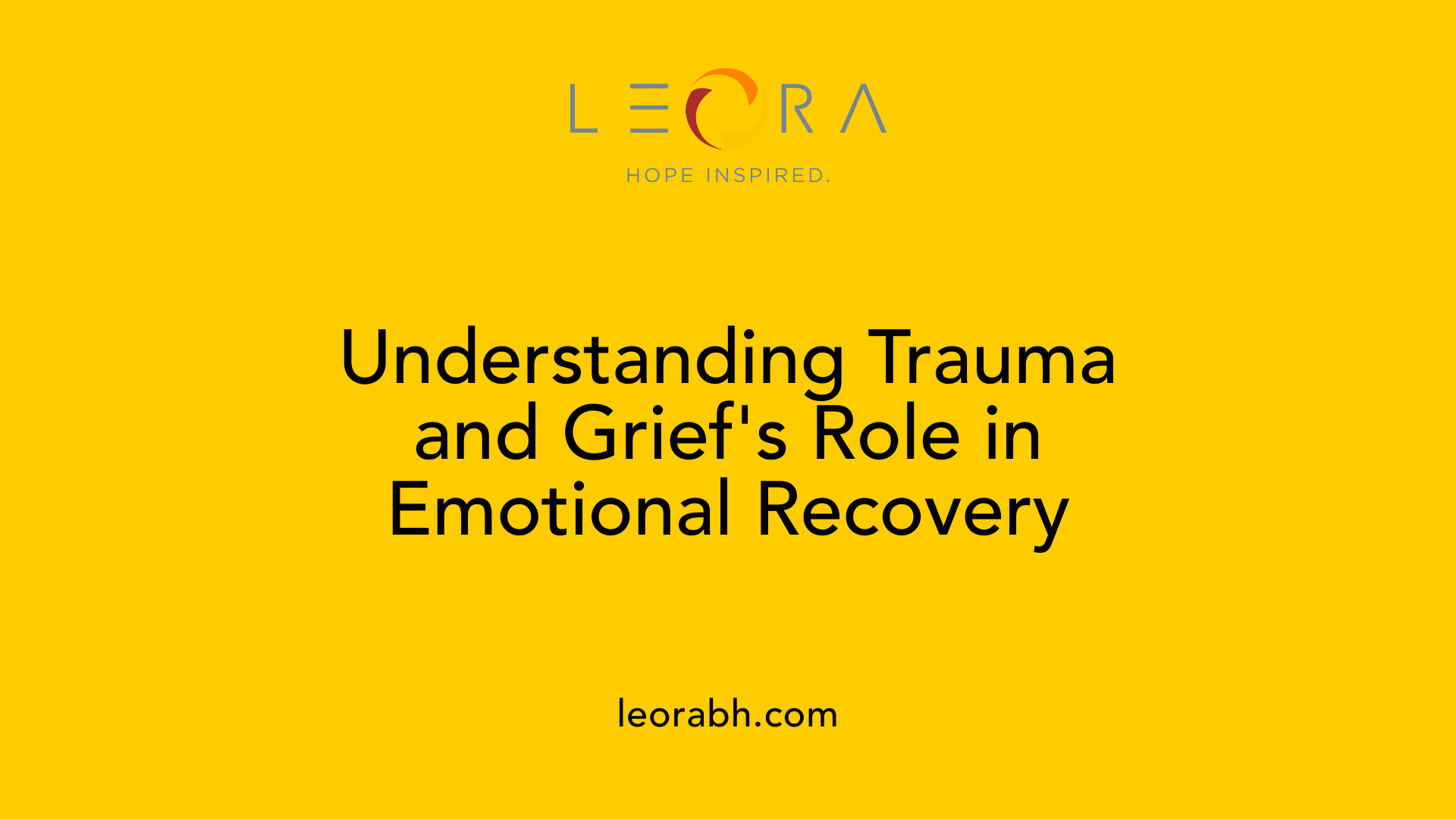
How is trauma recovery related to emotional healing in addiction treatment?
Trauma recovery plays a crucial role in the broader context of emotional healing during addiction treatment. Often, unresolved trauma acts as a fundamental cause or trigger for substance use, as individuals may turn to alcohol or drugs to numb emotional pain or cope with distressing memories.
Addressing trauma effectively involves therapies like Eye Movement Desensitization and Reprocessing (EMDR), Cognitive Behavioral Therapy (CBT), or trauma-informed care, which help normalize and regulate emotional responses. These approaches assist patients in reducing symptoms of anxiety, depression, and emotional dysregulation, which are common in both trauma and addiction.
Healing trauma can break the cycle of self-medication by fostering feelings of safety, trust, and emotional stability. When trauma is acknowledged and treated, individuals are better equipped to develop healthier coping strategies, reducing the likelihood of relapse.
Furthermore, trauma-informed care emphasizes creating a safe treatment environment, recognizing the complex needs of trauma survivors, and integrating emotional healing into addiction recovery. This holistic approach not only addresses physical dependency but also promotes psychological resilience.
By including trauma recovery in addiction treatment, patients experience improved emotional well-being, which supports sustained sobriety and a more fulfilling life. This integration emphasizes that recovery is not just about abstinence but also about healing emotional wounds that may otherwise impede long-term success.
What are the stages of trauma recovery?
The pathway to healing from trauma involves multiple, interconnected phases:
| Stage | Description | Emotional Focus | Support Strategies |
|---|---|---|---|
| Safety and Stabilization | Establishing a sense of safety and stability, managing immediate emotional and physical reactions | Trust building, emotional regulation | Safety planning, mindfulness, stabilization therapies |
| Remembrance and Mourning | Processing traumatic memories and acknowledging pain | Confronting pain, acceptance | Trauma-focused therapy, emotional expression exercises |
| Reconnection and Integration | Building relationships, re-establishing trust in self and others | Re-engagement, empowerment | Group therapy, support networks, social skills training |
| Consolidation and Future Orientation | Developing resilience, setting goals for future healing | Hope, purpose | Skill-building, future planning, ongoing therapy |
| Ongoing Support | Continuous care to maintain gains, prevent regression | Resilience, self-awareness | Maintenance therapy, peer support groups |
It's important to recognize that trauma recovery is often non-linear. Individuals may cycle through these stages multiple times, revisiting earlier phases as they process complex emotions and memories. A supportive, trauma-informed environment is essential for facilitating this gradual healing.
Why is trauma-informed care vital in addressing addiction?
Trauma-informed care recognizes that trauma significantly influences mental health and addiction. It involves understanding, identifying, and responding to trauma symptoms while avoiding re-traumatization.
Implementing trauma-informed principles—such as safety, trustworthiness, peer support, collaboration, empowerment, and cultural sensitivity—creates a treatment space where individuals feel validated and supported.
This approach leads to better engagement in treatment, reduces feelings of shame and stigma, and fosters emotional healing alongside physical recovery.
Addressing trauma head-on helps individuals process unresolved issues, reduce triggers for substance use, and develop healthier emotional regulation skills. Such comprehensive care improves overall treatment outcomes, decreases relapse risk, and promotes long-term mental and emotional well-being.
How does healing from trauma support the overall fight against addiction?
Healing from trauma is fundamental in achieving sustained recovery from addiction. Unaddressed trauma can serve as a persistent internal trigger, causing cravings and emotional distress that lead to relapse.
By working through traumatic experiences, individuals can rebuild their sense of safety, trust, and emotional balance. They learn to manage distress without resorting to substances, gaining resilience and confidence.
Trauma recovery also enhances self-awareness and self-compassion, empowering individuals to take control of their healing process. It fosters a stronger sense of purpose and redefines personal identity beyond substance dependence.
Furthermore, trauma-informed treatment supports the development of a robust support network, including therapy, peer groups, and community resources, which are vital for long-term sobriety.
In summary, integrating trauma recovery into addiction treatment not only addresses the roots of substance use but also promotes emotional healing, resilience, and a more fulfilling, stable life free from the cycle of addiction.
This comprehensive understanding highlights the interconnectedness of trauma and addiction recovery, emphasizing that emotional healing is a vital component for lasting sobriety and mental health stabilization.
For more in-depth insights, search terms like "trauma recovery in addiction," "trauma-informed care," "stages of trauma healing," "trauma and emotional regulation," and "healing from grief and loss" can provide valuable resources and current research findings.
The Non-Linear Nature of Emotional Healing and Recovery Pathways
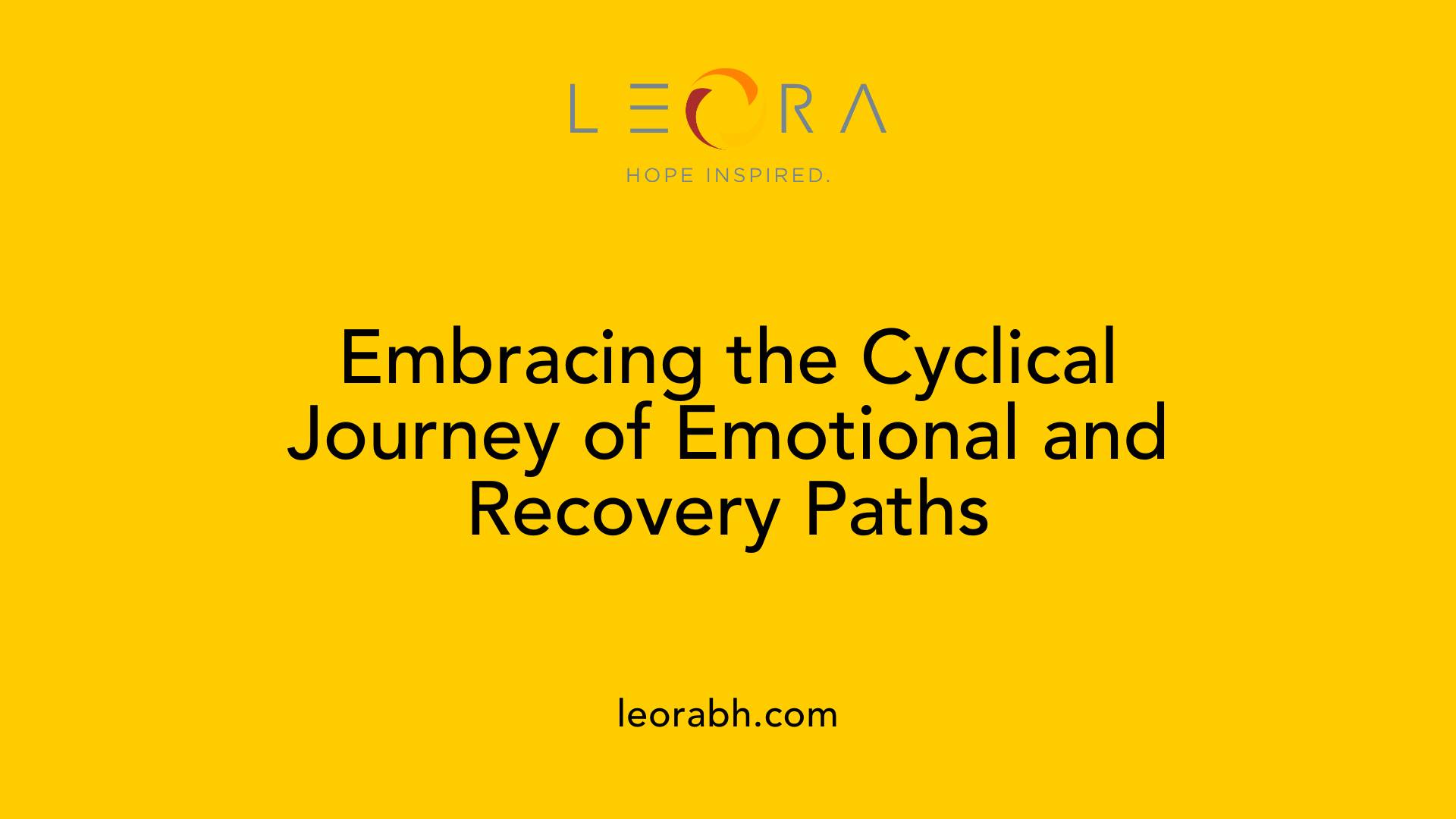
How does recovery involve a reciprocal and cyclical journey?
Recovery from addiction is rarely a straightforward process. Instead, it resembles a cyclical journey marked by progress, setbacks, and rediscovery. Individuals often move back and forth through different emotional stages, such as feeling hopeful, experiencing doubt, or confronting unresolved trauma. These cycles emphasize that healing is not linear, but rather an adaptive process that requires patience and resilience. Recognizing these patterns helps individuals understand that setbacks, like emotional relapses or slips, are natural parts of the healing pathway rather than failures. This perspective encourages persistence and self-compassion, fostering a mindset that values continued effort rather than perfection.
Furthermore, emotional recovery involves rebuilding trust, self-awareness, and emotional regulation over time. As people revisit and work through their feelings repeatedly, they develop stronger coping strategies, better emotional resilience, and long-term stability. This iterative process highlights the importance of holistic support, including therapy, support groups, and mindfulness practices tailored to each stage of recovery.
Why is relapse considered a part of the recovery journey?
In addiction recovery, relapse is often viewed as an inevitable part of the process rather than a sign of failure. It reflects the complex nature of behavioral change and the deep-rooted challenges involved in overcoming substance dependence and emotional wounds.
Relapse typically unfolds gradually through multiple stages—emotional, mental, and physical—each signaling different levels of vulnerability. Emotional relapse might involve neglecting self-care or bottling up feelings, while mental relapse includes rationalizing or justifying substance use. Physical relapse, the actual return to substance use, often occurs when triggers and stressors overwhelm the individual.
Understanding relapse as a stage, rather than a termination point, helps foster a compassionate approach. It underscores the importance of ongoing support and the need to revisit earlier stages of recovery, re-engage in therapeutic activities, and reinforce coping skills. Many successful recovery pathways incorporate relapse prevention strategies, emphasizing that setbacks are opportunities to learn and strengthen one's resilience.
Why is patience and compassion crucial in emotional healing?
Patience plays a vital role in emotional healing, acknowledging that recovery is a gradual process filled with emotional peaks and valleys. Each person's emotional journey unfolds at its own pace, influenced by past traumas, current circumstances, and individual resilience.
Practicing patience allows individuals to accept their feelings—whether they involve anger, sadness, or shame—without rushing the process of healing. It cultivates self-compassion, encouraging individuals to forgive themselves for setbacks and to celebrate small victories along the way. This tolerant mindset fosters lasting change by reducing self-criticism and promoting perseverance.
In a therapeutic environment, patience and compassion create a safe space where clients feel valued and understood. This supportive atmosphere enhances engagement, trust, and openness—all essential components for healing deep-seated emotional wounds. Over time, patience enables individuals to rebuild their emotional foundations, develop healthier coping mechanisms, and achieve long-term recovery and well-being.
How do setbacks contribute to personal growth?
Setbacks, including emotional struggles, relapses, or difficulties in managing trauma, are integral to personal growth in recovery. Rather than being viewed solely as failures, these challenges serve as valuable learning experiences.
Each setback offers insights into triggers, emotional vulnerabilities, and unaddressed issues, empowering individuals to refine their coping strategies and strengthen their resilience. Working through these difficulties often leads to increased self-awareness, better emotional regulation, and a deeper understanding of personal limits.
Moreover, overcoming setbacks fosters humility and empathy, enriching a person’s capacity for compassion—both for themselves and others. It also reinforces the importance of ongoing support, self-care, and the adaptability needed for lasting change. As individuals navigate and learn from difficulties, they often emerge stronger, more compassionate, and better equipped for a fulfilling life beyond addiction.
Supporting recovery pathways through tailored approaches
Understanding that recovery is a dynamic, non-linear process underscores the importance of tailored treatment plans. Interventions such as motivational interviewing, trauma-informed care, and flexible support options are designed to meet individuals wherever they are in their emotional journey.
Acknowledging the cyclical nature of emotional healing allows healthcare providers to adjust strategies, reinforce coping skills, and build resilience progressively. It promotes patience from clinicians and families, recognizing that setbacks are natural and manageable phases.
In conclusion, embracing the reciprocal and cyclical aspects of recovery fosters a compassionate, personalized approach. It empowers individuals to navigate their emotional pathways with hope, resilience, and the confidence that growth is always possible, even in the face of setbacks.
Supporting Long-Term Emotional Well-Being and Growth
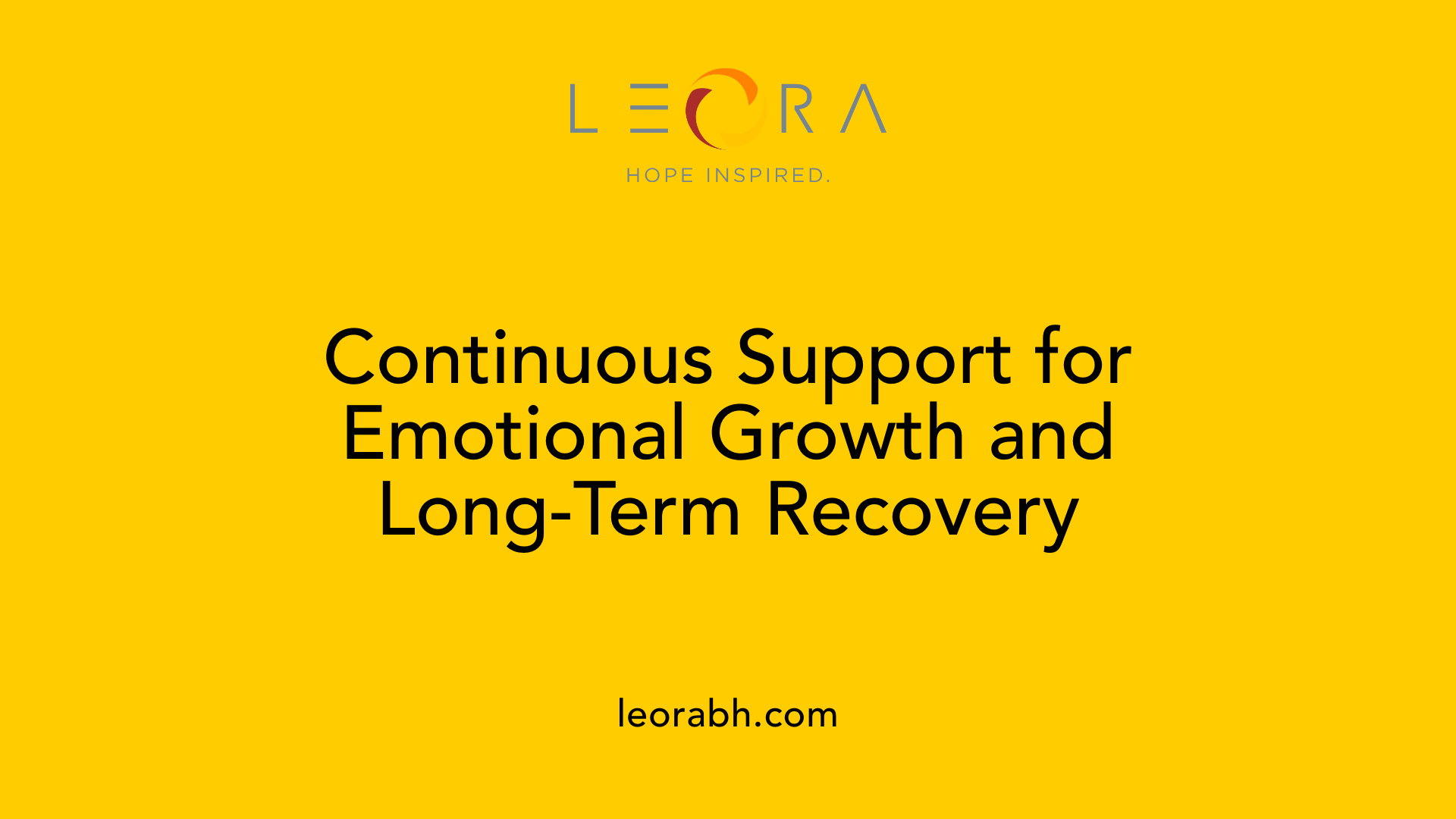
How can ongoing support enhance emotional healing and prevent relapse?
Post-recovery, maintaining emotional health is crucial for lasting sobriety. Ongoing support systems—such as therapy, peer support groups, and community resources—are essential pillars in this process. These networks offer continuous avenues for emotional expression, encouragement, and accountability.
Support groups like Alcoholics Anonymous or Narcotics Anonymous provide a community where individuals can share experiences, learn from others, and feel understood. Therapies, including cognitive-behavioral therapy or trauma-informed care, help address underlying issues and reinforce coping skills.
Long-term strategies such as mindfulness practices, routine self-care, and regular counseling sessions play a significant role in emotional stability. These practices help manage stress, reduce vulnerability to triggers, and foster resilience.
Building a fulfilling life involves establishing new routines: engaging in hobbies, nurturing relationships, and participating in community activities. These activities boost self-esteem, promote social connections, and create a sense of purpose.
By creating a supportive environment that emphasizes continued growth and emotional expression, individuals build resilience and develop habits that prevent relapse. Consistent emotional support nurtures psychological well-being, making setbacks less likely and recovery more sustainable.
What role does re-evaluation and goal-setting play in emotional growth?
Re-evaluation and goal-setting are fundamental to ongoing emotional development after addiction recovery. They encourage individuals to pause, reflect on their achievements, and identify areas for growth.
Regularly revisiting personal goals helps define new aspirations, ensuring continuous self-improvement. This process fosters self-awareness, identifies potential emotional barriers, and motivates perseverance through challenges.
Setting achievable goals—whether related to building relationships, career advancements, or personal development—enhances a sense of purpose and control. It reinforces positive habits, helps integrate learned coping strategies, and nurtures resilience.
Moreover, re-evaluation allows individuals to adapt to life's changing circumstances, ensuring that their recovery journey remains relevant and fulfilling. This ongoing process promotes emotional maturity, satisfaction, and a balanced sense of self.
In conclusion, sustained emotional growth hinges on deliberate re-evaluation and setting meaningful goals. These practices empower individuals to lead enriched, stable lives, reinforcing their commitment to sobriety and personal well-being.
Embracing the Journey of Emotional Transformation
Understanding the intricate stages of emotional healing in addiction recovery underscores the importance of patience, support, and tailored therapeutic approaches. Recognizing that emotional recovery is a cyclical and non-linear journey allows individuals and their support networks to navigate setbacks with compassion and resilience. Integrating trauma-informed care, evidence-based therapies, and strategies that foster emotional regulation empowers individuals to heal deeply, rebuild their lives, and sustain long-term sobriety. As emotional health improves, so does the capacity for meaningful relationships, personal growth, and a renewed sense of purpose—key elements in the triumphant journey of overcoming addiction.
References
- The Five Stages of Addiction Recovery | RACNJ
- Understanding The 5 Stages Of The Addiction Recovery Process
- Navigating the Path to Healing: Understanding the Stages of ...
- Stages of Addiction Recovery: Expectations, Needs and Coping
- The Stages of Recovery | Addiction Counseling Programs TX
- Stages of Grief in Addiction Recovery - Banyan Treatment Center
- Understanding the Stages of Addiction Recovery | 7 Summit Pathways
- Understanding the Stages of Change in Addiction Recovery
- The 5 Stages of Grief and Addiction Recovery: Emotional Healing in ...
Find Your Inner Light
Related Articles
Schedule an Assessment
Leora Behavioral Health provides comprehensive treatment services, including ambulatory detox, mental health IOP, and SUD IOP, to support your journey toward lasting recovery.
Our caring team will guide you through the admissions process and create a personalized treatment plan tailored to your unique needs. We welcome walk-ins. If you or a loved one is struggling, reach out today. We’re here to help.


.svg)




.svg)
.svg)
.svg)
.svg)
